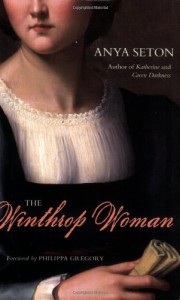Anya Seton, Elizabeth Fones, and Proto-Feminism

This is a really long book, and for that reason is difficult to review. There are a lot of things going on in this book: religious freedom versus religious persecution and the rights and oppression of women in the early colonial period.
Elizabeth's history can be summed up neatly with her full name: Elizabeth Fones Winthrop Feake Hallet. She married three times, only finding love at the end of her life with her marriage to Will Hallet. Her first husband, Henry Winthrop, was both her first cousin, and a bit of a wastrel. He was the son of John Winthrop, Elizabeth's maternal uncle, who emigrated the Massachusetts Bay before Elizabeth, with his father.
John Winthrop was the 2nd, 6th, 9th, and 12th governor of Massachusetts Bay. He delivered a shipboard speech in which he said:
For we must consider that we shall be as a city upon a hill. The eyes of all people are upon us. So that if we shall deal falsely with our God in this work we have undertaken, and so cause Him to withdraw His present help from us, we shall be made a story and a by-word through the world.
This is the first time that what would become the United States of America was referred to as a "city upon a hill," a rhetorical flourish that has been used many times since Winthrop adopted it. When Winthrop made the speech, however, he was not contemplating a place of religious freedom - rather, it was his intent and the intent of the other emigrants, that they would create a perfect exemplar of Puritan society. They fled religious persecution in England, and came to the colonies to create a society where religious persecution of other faiths was a part of their community. They exhibited intolerance for other religious views, including Quakers, Anglicans and Baptists.
There is a pervasive sense, perhaps driven by the American historical narrative, that the early colonists were a live and let live sort of a people. Yeah, no. They weren't. Not a bit of it. The Puritans were rigidly segregated, particularly by gender, but also by status. The electorate was limited to freemen, and there was a religious test for election to public office.
Against this backdrop, Elizabeth Fones Winthrop arrived a widow, her first husband having managed ignominously to drown himself in the North River in a swimming accident. She was young, beautiful, headstrong, and it didn't take John Winthrop long to realize that he could marry her off and gain some benefits. She was persuaded to accept the proposal of Robert Feakes, a decision that was to prove utterly disastrous because Feakes was, to put it charitably, weird. Elizabeth's life both improves and deteriorates as she becomes embroiled in a scandal involving Anne Hutchinson, a woman who definitely stepped outside the gender lines. The Feakes ended up moving to Greenwich, which was undeveloped and primitive, and Elizabeth has 5 more children by Robert Feakes.
At some point between 1632 and 1647, Robert Feake's mental health utterly collapsed, and Elizabeth ends up as more or less a caregiver for him. She also takes on the role of family protector, and has property in her own name, which is deeply scandalous to the community. During all of this period, Elizabeth is repudiating the subservience of women more and more obviously. There are accusations of witchcraft, and then, ultimately, Robert completely loses it and abandons his wife and children. Elizabeth is on her own, in an inhospitable land.
It is the final addition to her name that brings her story to a close: Elizabeth Fones Winthrop Feakes Hallet. Elizabeth secures a divorce - maybe - and marries - maybe - Will Hallet, a man of lower social standing who was sort of a business manager for Robert Feakes. This is so scandalous that she is forced to flee the English colonies, and decamps to the more tolerant Dutch colonies, where her marriage is recognized and she is not hanged for adultery. According to Seton, it is Will Hallet who is Elizabeth's true love, a man younger than she, but taken with her strength, her passion and her beauty.
I've read two books by Anya Seton, both of which feature strong female historical figures who live outside the lines of their time. The first, Katherine, is set during the late Middle Ages. In both books, Seton's main female character is able to manipulate the contemporary social mores to advance their own interests. In both books, the main female characters behave sexually in ways that are considered to be abandoned and immoral, and yet they ultimately prevail in forcing society to legitimize both the relationship and the children born of the relationship.
It is always interesting to read about stunningly successful and independent historical women who are able to challenge the gender norms of their times, although I think that it is really important to recognize that the Bess Hallets and Katherine Swynfords were extremely privileged in other ways, which would have contributed significantly to their ability to get away with their repudiation of societal mores. Bess's connection to the Winthrops insulated her from the kinds of punishment that were inflicted on other women. It isn't much after her death - approximately 20 years - that a series of mostly women, and a few men, were executed as witches.
The other thing about this book that I found completely fascinating is that it focuses on a period of time that is not particularly popular as subject of fiction, and the lives of the colonists are mythologized in a way that isn't particularly accurate. This mythology tells a good story, but not a true story. And the truth is important.
So, this was a really long post. If you made it this far, congratulations!






 16
16
 3
3
